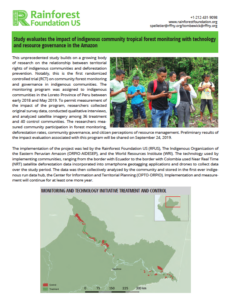
Indigenous-led, forest monitoring interventions yield credible and “measurable reduction of deforestation” in the Peruvian Amazon, according to preliminary results from a study led by Columbia University researchers.
This unprecedented study builds on a growing body of research on the relationship between territorial rights of indigenous communities and deforestation prevention. Notably, this is the first randomized controlled trial (RCT) on community forest monitoring and governance in indigenous communities.
The announcement was made on Tuesday at the Ford Foundation by Rainforest Foundation US and its indigenous and institutional partners.* The findings led to a vigorous discussion on the potential this type of intervention could have in reducing deforestation across Indigenous held territory in the Amazon Basin and beyond. A briefing on the findings can be accessed here. Indigenous leaders and forest monitors — the men and women on the frontline of rainforest protection — described how this integrated technological approach was providing tangible benefits to their communities.
A video broadcast of the two-hour event will be posted on our site in the coming days.
The implementation of the project was led by the Rainforest Foundation US (RFUS), The Indigenous Organization of the Eastern Peruvian Amazon (ORPIO-AIDESEP), and the World Resources Institute (WRI). The technology used by implementing communities, ranging from the border with Ecuador to the border with Colombia used Near Real Time(NRT) satellite deforestation data incorporated into smartphone geotagging applications and drones to collect data over the study period. The data was then collectively analyzed by the community and stored in the first-ever indigenous run data hub, the Center for Information and Territorial Planning (CIPTO-ORPIO). Implementation and measurement will continue for at least one more year.



